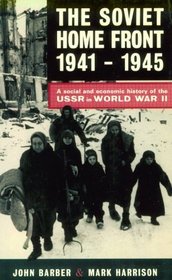An often dry, but still interesting analysis of how the Soviet Union dealt economically with the German invasion during World War II. The book somewhat explodes the myth of how the Soviet government worked to rally the economy and production. Finally, the authors show how the people themselves adapted to accomplish a miracle against all the odds. Deaths caused by the German Army and stupid Communist policies resulted in 27 million deaths in the Soviet Union.
Some stupid mistakes by the government include sending in arms and supplies to Leningrad before it's year long encirclement. But the trucks returned empty when they could have evacuated people. As a result, over one million starved to death in the city. And how trained technicians were rushed into the Red Army, resulting in factories hiring untrained peasants which drastically reduced production. And how the factories needed millions of worked to replace those who had gone to fight, but hundreds of thousands of prisoners starved to death in the Gulag camps. Most actions by higher-up communist bureaucrats clinging to their dogma slowed productivity. Whereas the local managers learned to adapt techniques to cope.
The Soviet people paid a terrible price to achieve victory, and you can only admire them for it. I'm reminded of an incident which took place in Moscow shortly after the war. Lieutenant John Eisenhower, General Eisenhower's son, was a member of a delegation visiting the city. At a banquet when both sides began toasting people, John Eisenhower stood up and proposed a toast to "The Man who defeated the German Army---the common Russian soldier." There was a lot of truth in that toast.
Some stupid mistakes by the government include sending in arms and supplies to Leningrad before it's year long encirclement. But the trucks returned empty when they could have evacuated people. As a result, over one million starved to death in the city. And how trained technicians were rushed into the Red Army, resulting in factories hiring untrained peasants which drastically reduced production. And how the factories needed millions of worked to replace those who had gone to fight, but hundreds of thousands of prisoners starved to death in the Gulag camps. Most actions by higher-up communist bureaucrats clinging to their dogma slowed productivity. Whereas the local managers learned to adapt techniques to cope.
The Soviet people paid a terrible price to achieve victory, and you can only admire them for it. I'm reminded of an incident which took place in Moscow shortly after the war. Lieutenant John Eisenhower, General Eisenhower's son, was a member of a delegation visiting the city. At a banquet when both sides began toasting people, John Eisenhower stood up and proposed a toast to "The Man who defeated the German Army---the common Russian soldier." There was a lot of truth in that toast.




